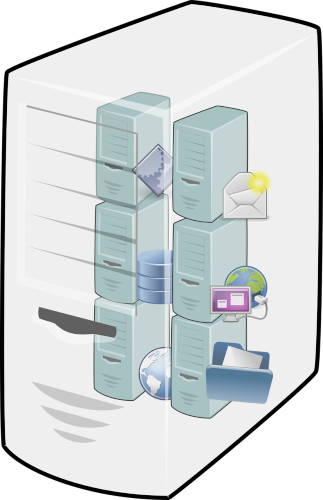Virtual Private Servers
A physical server is just as the name says, a server (physical computer) on which an Operating System, like Windows or Linux runs just as on any other computer. Using virtualisation software multiple virtual computer systems (VMs) are created by simulating hardware functionality. Virtual Private Servers allow you to store all files and data for your website on web space that has been configured to look and feel like a standalone dedicated server.
A Virtual Private Server (VPS) is more or less exactly what it sounds like - you rent some resources on a physical server run by a VPS company, which provides a closed environment that acts as if it was a complete physical remote server. Basically, the cloud VPS (Virtual Private Server) hosting is when a web hosting provider takes one massive server and partitions it up so that it can have several servers on it, each of which can run its own operating system and can be re-booted independently.

Most of VPS providers are offering 2 types of VPS: managed and unmanaged VPS:
-
Managed VPS: The hosting provider is responsible for the configuration, security, maintenance and software update of your server. It is a great way for you to have an expert manage your server while you focus your attention on your brand, business and customers.
It sounds great, but what's the catch? Your data is under someone else's control and your only choice is to unquestionably trust your VPS provider. -
Unmanaged VPS: You will receive the VPS from the service provider but will be tasked with installing, updating, customising and basically managing your server. However, this way you can custom-build your VPS for your purposes. You will be in total control over it. Essentially everything is left up to you including the updates, monitoring and security features.
What can I do with a VPS?
-
Use It to Run Your Website. VPS offers more flexibility than shared hosting and yet is affordable. It allows you to install custom software. You can fully control your server by installing and removing software instead of being stuck with the one a particular hosting platform offers.
-
Host your own E-mail or DNS server. It gives you more flexibility and control. You can make e-mail accounts as you want, add accounts easily, or host multiple domains. Since you are maintaining the server, you can control what kind of spam and virus protection you are running and make sure that the software stays up-to-date.
-
Backup Server. Our Backup Server solution works fine on an off-site VPS. The storage encryption is recommended to increase security.
-
Self-Hosted Private Cloud. Our Self-Hosted Private Cloud solution works fine on a VPS. The storage encryption is recommended to increase security.

Let’s schedule an initial consultation meeting at your offices to discuss this solution in greater detail!
